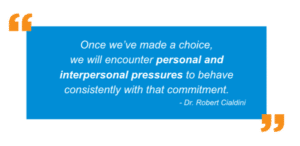The Cialdini Commitment Concept: Start Small and Win a Lot Later

When you apply the commitment and consistency concept of persuasion, it produces a greater return on several marketing fronts. Here’s how it works, and how it boosts response via your website, social media, business development plan—and even in clinical case acceptance. The thing is, people tend to follow through with commitments they feel they have already made.
So—as this principle dictates—the first step is to ask the prospect/customer/patient to agree to the first small step or action. Those who accept the first (small) part will later want to be consistent with their commitment. So when you subsequently ask about something more, they will justify their previous decision and agree.
Here are some quick examples of how a first little bit can have a larger payback later.
Long online forms, a bite at a time. From time to time a client asks us to add a long form--maybe 20 or more questions--to their website. The visitor is expected to enter a ton of information and particulars. Invariably, asking for a lot of data right up front is too intrusive and an immediate visitor turnoff.
The successful alternative is to ask for a tiny bite of useful data first—maybe just their email address and first name. Individuals who agree and provide this small slice of info will subsequently agree to a provide more particulars via a second request.
Likewise with online surveys. Visitors are reluctant to respond to survey when they know at the start that there are 10 questions. Instead, ask the two or three most important questions first, and then invite the reader to answer a few additional items. Many people will feel committed to the completion option and continue to respond.
Free information and/or samples. Online products or services can sometimes be expensive. The greatest value in offering a low cost “first bite” is to open the door to a later (and larger) purchase. For example, it’s useful to give away the first chapter or two of an online book at little or no cost. And individuals who accept the initial slice will justify their earlier decision and will purchase the complete book.
The Cialdini “commitment concept” is something like the old-school “foot-in-the-door” idea, where accepting a small idea or buying a small item changes a “prospect” into a “customer.” What’s more, reaffirming the earlier choice begins to build trust. You can apply this concept to your social media with a small initial start and building. Individuals who, for example, make a brief, initial comment are likely to become regular discussion participants with encouragement.

-0-
Robert B. Cialdini, Ph.D., is the Regents' Professor Emeritus of Psychology and Marketing at Arizona State University and was a visiting professor of marketing, business and psychology at Stanford University. Dr. Cialdini is a respected, best-selling author of several business, marketing and psychology books including Influence, The Psychology of Persuasion.
Related Articles:
Using the Six Principles of Persuasion in Healthcare Marketing
Three Clever Little Marketing Tricks That Really Work
Healthcare Consumerism: How to Avoid Being Left Behind
9-Point Call-to-Action Checklist for More Engaging Healthcare Marketing Results
5 "Little" Details That Affect Patient Retention/Conversions









